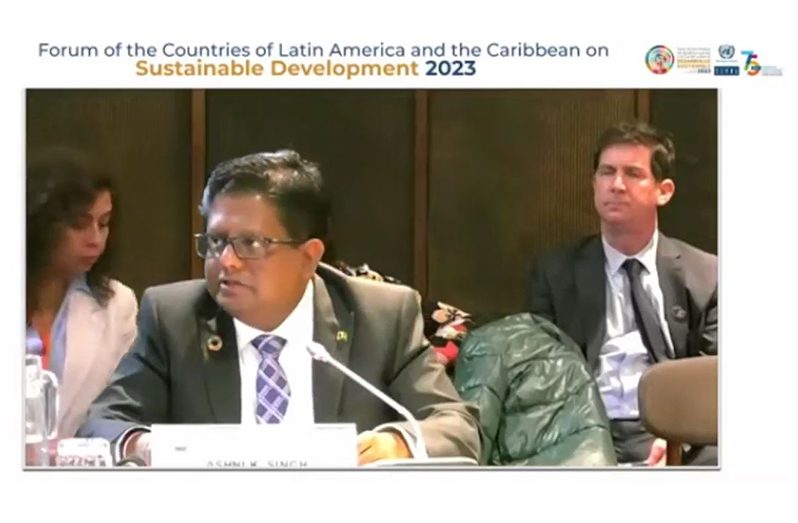– reiterates call for international community to recommit itself to agreed undertakings during ECLAC forum
DURING the Sixth Meeting of the Forum of the Countries of Latin America and the Caribbean on Sustainable Development, currently underway in Santiago, Chile, Senior Finance Minister, Dr. Ashni Singh, said Guyana reaffirms its commitment to Agenda 2030, both in terms of the country’s national policy agenda and ‘our call to action by the international community’.
He outlined several achievements, over the last three years, that allowed the country to become one of the fastest growing economies. Such included the rebuilding and strengthening of key institutions of the State, bringing itself back from the brink of bankruptcy, regaining fiscal solvency and sustainability, rebuilding and steadily improving public infrastructure and social services, and restoring its credibility as a destination for private investment.
Dr. Singh highlighted, further, that, within three decades, Guyana has resumed and consolidated its place among democratic nations. The Minister then called on the international community to recommit itself to those undertakings already agreed if ‘we are to stand an even remote chance of achieving the lofty objectives of Agenda 2030. ‘Nothing less is required’, Dr. Singh underscored.
The Senior Finance Minister was part of the panel that addressed ‘Strategies to Advance Implementation of the 2030 Agenda for Sustainable Development in the Caribbean’. He took the opportunity at the forum to highlight two particular strategies to advance the national and sub-regional agenda in a manner fully consistent with Agenda 2030.
“These most recent economic developments have placed Guyana in a position to accelerate the implementation of Agenda 2030, to which we are firmly committed. Indeed, even the most cursory examination of our successive national budgets in recent years will indicate very close alignment between national policy priorities and Agenda 2030,” the Minister posited.
Guyana is currently spearheading CARICOM’s Food Security Agenda ‘25 by 2025’, which seeks to reduce CARICOM’s food import Bill by 25 per cent by 2025. The country has also outlined its second-generation Low Carbon Development Strategy (LCDS) as a successor to the first LCDS. In November 2022, Guyana issued the world’s first jurisdiction-scale, sovereign carbon credits as the next phase in Guyana’s creation of a global model for forest climate services. This was followed shortly afterwards by the world’s first sale of such credits in global carbon markets, for a minimum payment of US$750 million between 2022 and 2032. The LCDS reinforces Guyana’s very strong climate credentials, including that, even as an oil and gas producer, Guyana remains and is expected to remain a net carbon sink well into the future.
During his presentation, Dr. Singh, however, lamented that “as a committed member of CARICOM, which comprises some of the smallest and most vulnerable member states of the United Nations, we wish to associate ourselves with the often-expressed view that the international system has failed the most vulnerable countries of the world.”
“To put it most starkly, the commitment to mobilise and deliver 0.7 per cent of Gross National Income (GNI) in Official Development Assistance is now more than five decades old. It remains prominent in its non-achievement by all but a tiny handful of countries, despite reaffirming it in the Addis Ababa Action Agenda. The same can be said about the 2009 commitment to mobilise and deliver $100 billion worth of climate financing by 2020, another objective that remains prominent in its non-achievement,” he said. The Minister added, “In much the same manner, and specifically in connection with vulnerability, the work on developing a multidimensional vulnerability index (MVI) on the basis of which eligibility for development finance would be determined has been ongoing for over three decades, with no conclusion in clear sight”.
Dr. Singh pointed out, however, that despite Guyana’s challenges, it will continue to work towards meeting its objectives.
“… we in Guyana are under no illusion of the magnitude of the task before us if Agenda 2030 is to be successfully implemented. Indeed, notwithstanding our relatively strong fiscal position, successful implementation of Agenda 2030 will require a level of investment that exceeds the still limited fiscal resources available. The challenge of financing sustainable development is further compounded when our inherent vulnerability especially to climate change and other external shocks is taken into account,” the Senior Finance Minister explained.
The meeting commenced on April 25 and will continue until April 28.



.jpg)








